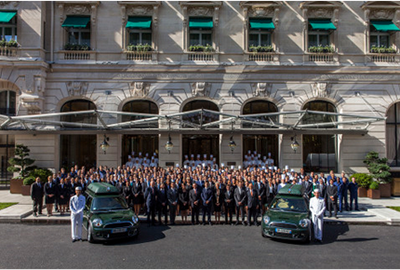Global hotel brands often have a reputation that differs markedly across countries, reflecting the challenges inherent in scaling service, according to a new survey by the Luxury Institute.
The "2014 Luxury Hotels Brand Status Index" charts how consumers in different countries regard global brands. Interestingly, hotels received, on average, higher scores in China, indicating that new expansion efforts in the country are a culmination of everything a brand stands for.
"When you build something that’s new and when you staff it with new people, you learn from the past, and from the culture," said Milton Pedraza, CEO of the Luxury Institute, New York. "They have put their heart and soul into these places to provide an extraordinary experience, and it's a culmination of all their learning.
“It's hard for one brand to sustain a global leadership to be top tier in different countries," he said. "There are different circumstances, different needs, different stages of development.
"The best you can do is be in the top 10 across countries."
The Luxury Institute's "2014 Luxury Hotels Brand Status Index" surveyed affluent overseas travelers who about their impressions and evaluations of 37 global luxury hotel brands.
Differences
The LBSI scores "are based on each brand's perceived quality, exclusivity, social status and overall guest experience," and are on a 10-point scale.
Respondents also say if they would recommend the hotel friends and family, if the brand is priced too high and if they will return to the brand for their next trip.
The Luxury Institute surveyed consumers in China, Europe and Japan.
Predictably, brand scores varied by region, reflecting how brands struggle to supply a consistent experience worldwide and how consumers have different expectations depending on their background.
In Europe, respondents were from the United Kingdom, Germany, France and Italy. The Ritz-Carlton received the second highest score with a 7.95, The Mandarin Oriental came in fourth with 7.86 and Leading Hotels of the World came in fifth with 7.77.

The Peninsula Paris
The Leading Hotels received the highest ranking among Chinese consumers, which also constituted the highest ranking overall, at 8.62. The Luxury Collection came in third in China with a score of 8.54.

Leading Hotels makes a commitment to organic cultivation
The Ritz-Carlton resurfaced in the top five in Japan with a score of 7.73, that was bested by Waldorf Astoria's 7.8.

Still from Ritz-Carlton social video
Hotel brands included in the survey included Aman Resorts, Armani Hotels, Banyan Tree, Club Med, Como Hotels and Resorts, Conrad Hotels and Resorts, Fairmont Hotels and Resorts, Firmdale Hotels, Four Seasons, Grand Hyatt, InterContinental, Jumeirah, JW Marriott, Kempinski Hotels, Le Meridien, Langham, Leading Hotels of the World, Loews Hotels, The Luxury Collection, Mandarin Oriental, Oberoi, Orient-Express Hotels, Pan Pacific, Park Hyatt, The Peninsula Hotels, Raffles Hotels and Resorts, Regent, The Ritz-Carlton, The Rocco Forte Collection, Rosewood, Shangri-La Hotels & Resorts, Small Luxury Hotels of the World, Sofitel, St. Regis, Taj Hotels Resorts and Palaces, W Hotels and Resorts and Waldorf Astoria Hotels and Resorts.
Tight rope
Mr. Pedraza emphasized that as brands expand, they tend to cede the ability to provide consistently strong experiences. Consequently, brands have to balance the demands of scaling their portfolio and maintaining superior service.
This can lead to lopsided perceptions in different countries.
Intense competition has impelled brands to accelerate their expansion plans.
For instance, Starwood Hotels and Resorts opened 74 hotels across its nine hotel brands in 2013, with new luxury properties in Abu Dhabi, Greece, Thailand and Peru.
Starwood claims to have doubled its luxury footprint in six years to a total of 160 properties and will continue this upward trend by adding 10 more luxury hotels in 2014. The collective effort of the company’s nine hotel brands for global expansion dwarfs the efforts of contenders (see story).
Boutique hotels have benefited from reputational slips large chains have made, by enforcing the idea that scale can be detrimental. However, many brands are able to leverage best practices from previous properties to create superior properties as they go along.
"Boutique has the advantage of not having so much scale," Mr. Pedraza said. "You can control things more."
Final Take
Joe McCarthy, staff writer on Luxury Daily, New York
{"ct":"2e5hxCQjtmZRKxdJZR9U5\/FdGShv82hKtU8PqUqQ1RXsvflJ3ymsgQYkBoToBeHxelnLvkbXaDwbbqtbOnPHujQcxa3kpBKOSsJhAPgF5o+rhl+kLlfNXhft9fHLTfUVocBM56wVM8AH0yiA18UIe2TK3uD4qHzY715XuhHqtztFPR6vuL2qmHZJvu81\/8YQmIvKeoFDm+fW5xPqVABfXHMOSLY20J1JCtJE+iEiBH1pdYws6kifc46D7QDqeFSdo9y8GC4IpDVNatk0+pT2jWE2sG\/qqCo7DsHeYiFuMDJPIiEJtiksInzIHrWCsauFNEjfIDEXf1kaHp3N74fV0YC8VwL2hI6NQXwwqt70pBYO1t8SqNyYFCVrjA2o1QLdfdPkFokBv3wIARWLgsouSoMGfwtXpZH48M977uvD99L3uPfcDzvizgcC6t49ZPCNyJG1Nz68yL7f6miMlpYJ9GLTzD1AeQWGDyoZnW5Rto\/rUObj56hcedV4Ga\/AzCPNK0UcS6HI2ziWRpsEYX9iMgheL39jDNxupj2LGdVKrAUYRT\/VJS\/M8k04Kfygv0mLuQexvZ2wrlxUnEUYep7K9j\/Gm8f+VTyGcW3zWlE3swF5wbln9Y2oAfdskI\/IJBGYAxofMrnzFrLZWS1PZ\/iuKqgKH2wCvwrZ57sHjjOPUz7VG1AH+o5Sc0eNpEGa2+VMaPz1EVn5FInO+5c\/JePQs2Do53UqAMqor7Y56WT6t592D1ABiRHKfjFikmGc8WBMQqxDKSoZDG49Xrmdjd3X7sxFYJaNvgAcFEm7PpCpnwOwbWfwA5xMAT2OGnt8YDIcNnz1KF\/sTCKLkkv6vxxuofEZUpn85W6kIDAi8\/L8yYCX+aAiSNE\/n3NPH9CQcM5gGC7lCKl71F+Nwk6LRdSW050x5GhomCgfwUZiWhkt91ZIgMsIWEsFzz+WSrUbUEuZDxUqp4OUoFgqnfPN7Jn\/aOpgGtKGfwLl88dnE4EebUQd5vO44KPk4yS8auAuQrTFwjaHbd3+BHVfH2xfAfRawohFUhVMcmJ2jLcCmln2PQ8\/kU57E9b0C7tHali923qCihJ\/iUmezIY014KEujeioWhdZK2a2HwIo\/0iwfMJogQWzNyV9RFiNZi43E67zkjREvXX7etDv3W6JZ5Dh3vbHHg7karH7eV9yI7hCcIpWeCYyP\/LOaiX6AVvcOXWP2nIL22c7TyRUIKzHdrc+2S+rPkc7HJ1T5evLh36toMzGkXT7L1dhEgIA\/QJMd\/8FTjlOIoViC4KGPuy1NGpht4Fo99OXNSznybWOM35q670ts1Y8rZZ7ftFCBLjrwq5NrsqkjO\/rVy8GGk8pKXSAHs79TQeGvlNN+Sl2T+9IYB4tM9VWDfdakAo\/hWgtHftvbuW9hHQw9xwo6J91bd36CaFqaJGhZb9Nk4YdJRlT0ej6p\/QADB\/D51loVTKKDY47dzmhSTRkYTJYh0arWw2pzInq4IVn173m23pYxG5zyevopjfFu7Xbp01A83nMIibnfucRHfv8XcCE0TpST0uTVcRUYUoXz8dH\/e96fXCSTm6hql6MDtT5R3LL\/ZTdy9\/kXmNhyzWm2hL21VLiwrf7Sn6zUqD+bZFflN+EGczW\/KzMduCSmeja3sXape3tbW1pfJ8m6wOoA0S6xEEJXEl287I1Gq09G6BT2hSuiq\/L6wjrU87YJJXrtj8xBeea+0PJysFVfyRECQK60SckmljB24HRvENaHBC7E4KQo7qSgcRZ96ibqlmprpXGDDPeAAaIScdlxczo\/i0t1kzzZBkmdWXcAZC0vJmo7T1Dy4SJ9Y168cZ8hnT3t6tVccEcAErpn4MJoS4BXHWPV6WoGAuZwjcZArE7qZagJy5NbJXgjsqNKPDzEdvoI2zLUQ+OwROD\/vn2ZYN6RIGHQN0vMIA2Qd2Z7BbhQBLCipMYqkyqQ5e4elvvhVi8maSKXDNfQgthJ+soOp\/0Gq3dMUIkwpfHXGL\/sVbGB2\/YNpOiF750QCQptw6EX3dSEU51GRmNgRz94dmsAgGyvS1i9WnJWEJTQsUpqP1fXsEoHdxBJnFoqLL0I3kS1KmPKsxtsZCn45ngV0XyG+qzbKENKP0r2opQQ8zBraaE6Hamu3eAzQkUgvBzN1WXL\/lGO20GyHRQoLsdTcUspkY6Bce5PEEcsJ1QZJA0Rs7kwCuUAZTgwsPvGJIb00PactDsE0kfYenM1xFYBtUzaSIvDAIHuAtK\/a07Kq0iNtJo7Zy0D1Kd46anSi67YdZDuUU2wMOwo\/qBbe06fXwz5Qqc+1riF6y3Ek25bctkULrWbbs0Fxz9bwrt+LsveXNg06v7+xDGCddKspCVFh6gyi2b+Tl7ggOSNkBPH8IoZoHJRIyB7dKy47I9fVnu6RDHAu3PLzkOIz\/PLj0qzbm7hUDWaEbZ+efzjosNU5e1LpOJHMVB2zI721kTkh4+I3uIHA9J6Z468zEnOXFMGkCEABmzdLQJicy1jHqDNxz8A5IhSuHi4+BZF051JRSJjMCCxBlgFUAzsEbj0pCZ\/GJg57OzLgE++k0K1JjV28nVCiFgUGqjbzPL5Hq+s9i2pHQojM4trUv2aMSTc7D9M07p004xpraZChmHkSaqR8MXcsr4hm\/H5BKqL0TLTEeHcaPXXxx67X+o3jWFN98i1hzGiBnQNVgOfjY3mKffGPq1pPqa4wlVqqdbrLSdkbrGyb8brf+1bbcw4ZA+RhpJDg0Li524tNYD697kVnsijAI8cD3IlhOQVHo3qfrP1HJILMPLxhqlAUg1nrmYNgPBe\/2lu\/UxIFuhXekxPqV9xIY5WqEPDdXJzmojpIXW\/0TL3jnM95\/vZOyRzivVo8hjh+w80Ut+\/kKwncDIIuvt+y68uE0t2ohLyiv3Iz5qrpUwrEZ\/gUI87ZPL0LICTcReX9E9g1eYOE10JzraTGhfEmdYDL5iU6EKVtM7cmiEIbIviVk6TzcXYqrMteNVxLURojnsD4DZdUJRkJ1ARtbl7xPVTj+jrssFzag2E2HRVmurTFsRQ1J+FkwTPa5YFjy3+9NJqGZHlSqX3cvHluU3CFzH+FbpeNWRjJkG0WyhM6SdGTNbWbY6Ce+ZJGVcbxIfs5m5cCjjn2BAan5n25otA+g2TygJBzXyDx5sHmp+ezBT853qjSmna2c1x2\/JzaR+O6YBcsHrTTcgureg5padzXwHexZPnvZd2fTXD8F5f135lZ1uQpiY5E1gr3IyZAFlBciJpwu1\/qafHVzz2oMg3JkmmhxvE6a0ZM8hIBbB2L17kPKF0ChBIi1Tj14aNufZm6VRefcECuNCH6H+xzzPnfyxW89mjmc1FqeStwfhGwo073vjSvsTus2EBNNV6uIKBCQphPJ9m9sqmQd2scdZvO2mI4SqoK8FoSIEHWPb3TRLMpBlfP6E8GAS7Xc\/X6\/S0PoKjbxW7JelnnTDqLtvwFOucygT0P1SMMG77FDnQ96uy86v1ysJ7sFmugX\/Ab1jA0\/LxkOL\/GZCwV+gqlFcannYLP1uh0ICb2jDans9w+qT0AQfpGibUfVA0Iv8Eeirp3FNCWcjFDdHjgOtV5ZQTsjmcrpT2o1ctPWe0FjiWVGgvK6CvCD5hfGs560J67lyRtlF94SZrW4YUuROlmXRmogBj\/6kBld57erEhgtoQU+CbAfahxPv3R69sRWDEbGci\/9eSj3N4MC0\/KtrpAbzINWQuOxcVhtB4Nf3\/coHBXiHn3ErWjw8K3r4iK83iUo0x80nExV3nE88ZEWiplZLsmmeQHTFQeXWQH5DAYl\/kRFqGEiSgB5NSruhZ6TsWVJasAmxkNnuL1aZ9m11X+MbiO0h1Eh5p\/eRZW42O3fNa8GJhgAhF8eqFd6oAyv3kCXrtqrnBV1Vsr23yBKXNCs68HU88EIv+SG95dBCLgm9WF+gGXpp9IoSEOrS\/pMo4Lb+rVhol6AKCM3SNTnbl4Ab3M+Ao8yJsmN3nAigUNFdFMAqOvXKW5cgSft4QVbEeXqaMKRfda7g+\/Nt9KswX1u2sVnN39w7R0Qj5WFopGFNLHpLKCKozJ2\/hynm\/HBbt4XUxyMSZ08szWpXIz9mMYXNMg7SFkt6JLf2teOSKyzLv3VzRMLwiAAPPHWZYQid5araEMFOTQcVnRJOy78exL2HAHjwaMWgOwU51ZRl5\/CTqu+eketvG8E\/iJWw4XtPylCDNv7QqebWvAb1OmDD5AnoqQ\/fXwMZjAjoNYwBL0C7tJzqUVw+6cfVCwHQEhGGyqY+JhbPOcBmyCCYUvvOQACoWxRzH3MwVTiKjiXyjdUuHsnuZyQ\/0bfaj53dIch+rHV90ajJBsZjrzeF2MYzDtFMV2JRvf0QAAx\/8J1YJD68WHY7UTAUg5UxzjVrFijseN6W6HLfs0WOVOJSQrZyZGyGXJY89LNdq82WWfuvV4yy4rn\/E8aLsg4W0SKT1pystLh9vrPGhU\/QLSFz61kJ3iBt9Nvu1kdg4rv9jOIMcjl22p2Xvt5f6IRal4E8DkceYs24ECSYfJZlpDChN9AFqTWhDw9\/pXU\/+VYLSZvX\/cf4cK7GXKZgpeH5K5OrX4xRsXUK1au3K30RUtqHd0WwkJUgqMLV0gcAq4vgoT8gweqFKGlg56GCuFUtQnMlEsQQge7SyeKY697WGDdt2USHX37pJXsw4Z6xene2CPDUxVpQrSR53TzfafSlYkrJLSpZYae1Q4Q4mWtFpo1MIVnweapXJ4Fe7ySTG6puHwhVrkZXo9q1\/tMKxtXj1ygZpilxEj+I7Jo9z8WZuMDF3EWxjNwD+RUwLkEjFQ2V3pdn6WrB4kstZtPeVNYM8yIEpOlrDGINQeAu1ZTBhxzzG24fwKVbSD77GgmBdYPhZd\/QslS0ljR6BQsfiyWeZ\/KOEe0Vt3glmU\/x4E\/oGYQWCEib\/UWTPw09oc9e23S84deTFzLC28cLef7DKH6UPoyQJfA3POlpqqWEr9mmDD4jlLJIBXtJcCP7jLT9mIdr7jEVV771r6xSoBKl0ceTgHxgtBwZAhCHA2ve8QyflIeBOiTF6H0T6rlC6OclQUW3tBsBSRXRrA1b64x1oPvpa9TUVFfuNR2ODQV3FuG2Ni2hGZA30ClF1FKRYewY3IFWSJoW0iI6XHo1NSEWjVWEuMB8k7pYsXLuOhZM0GiLTVozB9WjtKzz9sBKOwvpFzZCt1OCrbUIkNHF0j6ASx8ep5RI\/5FJqRc\/+xzzhGxhJp5lCuAAlVmcy8wMiQaCQHcRq733X14NuOvTkZ\/3vv0mfY7hMTOojTCxDVy80gF9k752EjGEZOW0vdlOxWDp1TyhXQz7V3qBrMDkSYRqC\/NvE3ekHsBBx9oUZoMPD\/ACXL8lZfWDIn4Vxc0oGXbePlj26pjAm437lDvy8gZclhug6S\/2s+\/9JTPRboa2gtCVxNjIOjZwogV3\/BOV+z7vSut4Yb0R\/64CS\/JeMZvkmQ2n\/Dyq1oTLA\/06p4yqziDK\/rjHfyAaA0kmzwPiQuJ\/gP4JsX8OvcjQgy7WIlhP87wCkZ2N4PVgggDTDBqOwZEb6CiMn8iU2T02VDh\/wqD2\/wH9Egy\/q8aZCvXfMeaCJo7iLyUwXIiC91hn+CuzPiCIJTK0sTU9F7oF+CjeG4NlQO872ZAoyG\/9rs7lkfgezokvQnHS71GkD18GCIBZXfR2HIKq65K8dHMzWLajqpXYqK2VR\/NtOv01ZP\/qeGcipB7x2X+CWb7Mve3F06YANO\/B2Jvdm3xxms7DaBDTEaKEKqaBVLBS8izYMeEX2sWcTNJIzVEVUzpc6E9kmdd\/WN5Wpsu8ZO4YNG27MKZf6YQ0FBB\/oX2nkYxqAhCSX\/EBb61mHgZOyC\/lOdvDzCOsVuAGxwEfn17eF55tr5qBpzP1f+HKnzp5hebYGWiGiZo+A+WmfbHkxGwCtL3eEvBlv4f4dx728gnPuGV6cRFBqXskKzbQaKE\/XiuWVn+YwcHOmYLEjNb3SHJ\/Z30oIBW23jl\/7lTcBIqFhoYivYXNujLgwSOss9obeO4a92+kQ348ZiuCYRW4tJZd\/3q0C2KkLu3A4tQ5zl37jT4HOJ2MNnKQ7Jn7bDqf4+SBiXQRofni9dstCniG\/2CesQuNM+JgDEr4RiOEtdDYm6gr7pQp4rLJdi6kL3QCdeclfcgF+p6Nk5rsIX9fMk91KWv8AMoeCmRLp2aDRaYcoAB6r0sXFQujFEYyncAxOC3e7K3ctRjaxr8CyiY+cY7GUGCiruiqT2Z8VUAmXuU+AjJAQ0eYBYNc1a7sPRoNul4cInT4ClAd7w5vi8LSCmbRMAKsaZZn+DHqUBZ1NtruMJELEnjdXt7quM261fqrNdSBDk9r555bknnlLj08u+ti\/1fb6nZb9gL478BzJd6UeDC8eq1ZGVxUhRVvCi4wD4Wt9uh3XEsSkIpJAFmRbmAQrHj37DWe9JloERYqlggAMFC47QyKnPMPOgYGB+KkFtjHqy8ORiA0hQ2pb+I4+BwHOULfVKNqW4ntyJAfjLz46DI7SjzC7hbCc\/Vb1ysD2yzXHM1GYoxw5Tmo+w1GTe9mmvy8hWxGWJBwSiVD\/AWrQRSSPZHguR8FKbZABTtUYxbygMzfNqNALPbPp8+ryPxsba1CIMj5QSN1ZByEDCNw38tvfN72uekZTivuswbmChwrcNjbhU\/zqjJdw0A077PvvHiQwsdVj5JD7hq0l3K5CTF5CDaxidn9lkQy65PzLPOYRDOd+dFd43AHup12lsfEH\/kBPTE0e5V2Kz6Xpf4i8kvUOx\/eImETltEmZlp\/x2Y4e0Ak5O8tdngPairbEVpYZgiqk3hrR7WABXNlwyhi+hn70aFhAG3rkh6qyN\/ZCdje1xzx6brAmfVOcKj6mM2MYPpEjb+spuGFVy+wQPlaSFKX98TdZYqJvGsZqd0pW6BQqBKpAciz0aBZLviQiTxJtiXfUhwWB5p1iGQMgJ2YEz8XxUh5BC+Fmyf6angKQYVw\/bwTw4\/huBRC4UnHp\/mwD+N6aEjKyDZ0PXmA1qru\/ok2A6bPsihiaiFr+M8zbcn+IuV2EdQEZdV+H0Ca8lOFj6w9CvcdgyD1M4thTGT3N+q2Oms4bAAwIWOlHXNi2kMX2AramAnLWfJVEXHB8YLM\/brE6oIEWLaCkIpuAZ2feNe+wMOF4S978XjRox0n7FEdmkIYfZFUDEqHsBlg4xAAsAvY89kv1xEp6uHcPE6DG\/mAcydo6G2WkkSFsllGk1ToDQHehnIOYrZ4a4k3toOeIuGwn5WzbenhqL4CimJvvSnrYgKlmxeY5EyU8bIHOnX+4J9IJwc16wU9TqbRz1SW5aedlOvmVRe0XvzCrXsLJDLZU+pkilVYEV8aaAUU8mKsAgi8Ti4kZzCJs4OybC4wliVGZ5bLQmoug2\/30yH3wZ\/rmN72gCGl3alsIX2Za0Ut+ZDVL+OkCwysipqihRFakbCVlmo5Mz8fhbVCvmVwEVKaXTUHueisWZpYuA1Q9MOybxSkEzCMQ\/ug09\/ic2\/O94\/vQbMo17hDi+\/Uie8f9GcawLuUE09Cfb71hR\/H7ex8vbRdhVvueLzmduMckAzz44CguEKKqT3aSW59VYsp0lMG4OIlwbF+ueZjrXRB7hxQC\/cxBjS\/W28ehQdI5SQSKLIg3oyNpWLErb6BwxADti7VF3pLtxCvRJs+SM3mqJozkFwtvC1dDcRpVdt4jPhmF+K0kPhoh58\/DE9zzJWL2JS1jpCPGtvvNKexm2eBJQbOvVnA8BLMTEMI6QVTak1oLB2TM5O8qMX57FkMMBftWdODC4S9OPDnPdCjS7g3zPboFojKZ4QI2rJ8ZvAASa\/VXLmV5tAKBLFvh01KBDevZ0mmi7TcGYi2ClCbiwXUOXN8vt48fBDK2C+wOq9aJx3JK6OKoQqBHUufm2nW0bP4SNqNceqhQAPy4yEVBVUmK\/BSB94DHq83bsaO8IXocOt1qNOrAGiqU1k1e47YIQPp6svD6KU\/82\/L1hy+Zr+D\/eseub00XZpC15enFrGCJuPmS+1QDZSWKN79tXhQMpD0GBGXUf\/B07o6HvmsjBbsa7l3DnPy4YWF8iml+2wIzoUwE0\/+QujF4hrp5K+SgA3yECtd6MKyPTqV6Fw1GxlH2kLbW4A10yp9nHvkgPfzrsBmC9HAyhDxtO78R21zSyYpoFJm0+zgfaybVXEXvJSJco\/snuOp+CuJtRdi7kHhgRyO7UJE\/PZbwKMt9JSfM59E1mc+NKGgkcPTzyjdwAxYTPybbQWdPCjPkPIF3X5MNIpI2YXvmI6TnLseMEZcW+353WiGxzu54LZY87YJx9QiWQVGDAql2srmRBrUwcbC3\/Ptf7KY+1bo9PpDWS40lSvGzdAkQpOBQ==","iv":"02aa53bf087e79ef0446b083e3b9f238","s":"24928c1be22f3c83"}

 Exterior rendering of the W Beijing
Exterior rendering of the W Beijing